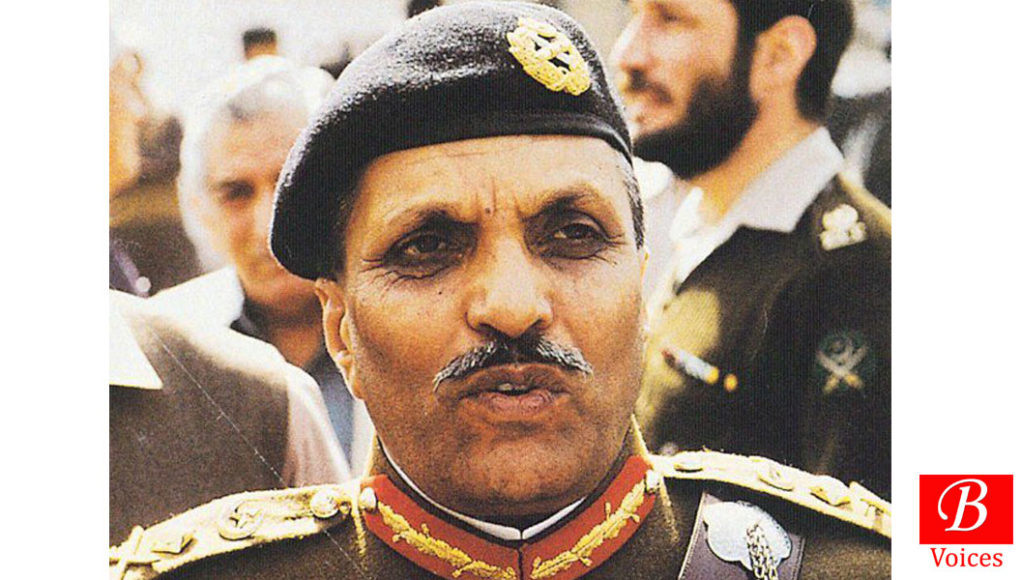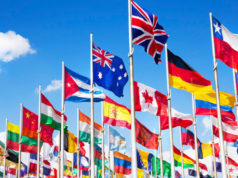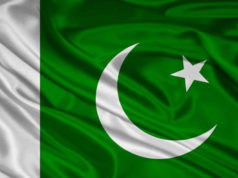Tahira Khan
General Muhammad Zia-ul-Haq’s regime kicktarted in 1977 by taking over the previous democratically elected government of Zulfiqar Ali Bhutto. Amid strong public backlash, he used ‘Shariazation’ or ‘Islamization’ as a primary policy of government not only to silence opposition but, also, to get firm control over the state and its institutions along with the maintenance of his image as ‘Ameer-ul-Momineen’. He in fact used all the three ways which has been mentioned above, under the title of ‘Nizam-e-Mustafa’, for turning the Pakistani society into a global center of Political Islam.
Plamen Toncher says;
“Bhutto was executed in April 1979. Under Zia, Pakistan saw an even sharper turn to Islamization, one which had a profound impact on the state and the entire society. In terms of foreign policy, Zia’s 11 year rule was marked by Pak’s closed ties with the Mujahedeen.”
In his award winning acclaimed comic novel ‘A case of Exploding Mangoes’; M. Hanif draws Zia’s sketch as “flattened, chubby-cheecked and marinating in his own paranoia”.
Zia believed that Pakistan survival is possible if and only if it is made an Islamic state run under the strict command of military and intelligence agencies. (Hussain Haqqani; Between Mosque and military)
As a third military ruler of Pakistan, Zia made Pakistan the global centre for Islamic Political hub where nation’s identity was made deeply embedded in the religion.
Constitution and laws were amended and formulated respectively to legitimize and broader Zia’s power whereas the authority of Judiciary was curtailed to zero. Religious fanatics and political parties became the important part of state.
In 1988, a law was passed which said that every judicial decision needs to be formulated in accordance with Sharia and Judges are required to consult theologians.
Thus, every organ of state- Judiciary, Executive and Legislation- was molded to favour Zia’s Islamization policy and only those actors were allowed to play their respective roles which were both in accordance with Zia’s will and his ideology of Islam.
Constraints:
Individual rational decisions are, greatly, structured by the constraints which are of two types i.e., Institutional and economic. Institutions are defined by Levi as;
“Institutions are the set of rules (and sanctions) that structure social interactions and whose existence and applicability are commonly known within the relevant community.”
Besides, organizations can make sense as “collective actors” to serve the functions as an institution in any society and economic ones relate themselves with the notion of ‘scarcity’.
General Zia, also, faced all these constraints which, undoubtedly, structured his Islamized policies.
Aisha Ahmed, Assistant professor of Political Science at University of Toronto, says;
“This is not the story of an Islamic zealot who changed Pakistan, this is a story of a strategist who had the interest of Pakistan in mind at a time and a place where Islamization was a strategic choice.”
She further reiterates;
“Pakistan’s fundamental identity according to many Pakistanis and particularly Zia-ul-Haq is that Islamic identity is what holds the country together.”
Since its inception in 1947, Islam has been manipulated for political and strategic ends as Ullema has been endeavored to put themselves in the driver seat of accurate interpretation of Islamic injunctions, particularly in accordance with the ideological basis of Pakistan movement.
Stephen P. Cohen notes in the ‘Idea of Pakistan’ that various small and major political parties has used Islam to get their political ends meet. Whether it is PML (N) or PPP, every politician is involved but major blame lies at the military doors.
So, it was not just Zia who originated the basic idea of Islamization but, indeed, he augmented the existing mechanism for his strategic objectives.
In addition, Pakistan was, at that time, facing severe economic crisis because of the Nuclear Programme where the Soviet Invasion of Afghanistan emerged as an opportunity for Zia who used it to get 3.7 billion dollars aid along with further 2 billion dollars being channeled through CIA for the assistance of Mujahedeen.
Individual rationality but Collective irrationality:
According to rationalists, a critical disjuncture exists between what is called socially good and what is individually beneficial. Before finding respective reasons behind the existence of disjuncture; one has to determine the preferences of key actors, first.
During the reign of Zia, there were two main actors i.e. military and Ullema (religious scholars). Amazingly, both the significant figures used Islam and external threats (Soviet Union) to meet their respective political ends. Military got key positions in civil bureaucracy whereas Zia introduced 58 (2b) to strengthen his power by dismantling power of both senate and the parliament.
Furthermore, various Islamic provisions were inculcated in the constitution whose consequences were favourable for the Ullema group (religious scholars) specifically and military particularly.
Indeed, both the respective players achieved their goals at the expense of collective rationality. It didn’t only derailed democratic norms and civil Institutions but, also, widened the sectarian conflict within the societal fabric which we have witnessed in form of cases like Salman Taseer, Asia Bibi etc.
The State as a Solution or Problem:
For the smooth running of any state, we need political leadership, organizations and public institutions which are needed for legitimizing the use of coercion. The question arises whether any of these things were present during the tenure of Zia? The short answer is ‘No’.
Zia engineered state constitution in such a way that it was difficult to differentiate between military and government. Military gained such a dominant position that it colonized each and every sector of state institutions whether it was at national or provincial level.
Even before Zia, there was no sound footing of state institutions needed for the furnishing of democracy.
Thus, we can say that neither weak nor very strong hold of state is required. For a successful running, democracy is needed to flourish itself along with the establishment of state institutions and elected political leadership otherwise rational choices will keep themselves dominating the whole of state for few individualistic desires.
Corruption:
It is rightly said that;
“Power corrupts but absolute power corrupts absolutely.”
According to rationalist, it is said that those who want to completely overwhelm public institutions usually wanted to work for their own individualistic interests rather than collective benefits. Same is the case with Zia who robbed country of most valuable resources and bowed seeds of terrorism, extremism, sectarian violence etc which are still persistent in the society.
Conclusion:
Rational choice theory tries to find the rationality behind individual acts of immense significance. By applying this theory we, somehow, has managed to find the factors behind Zia policy of Islamization. For the sake of argument, let’s suppose only Zia should be made responsible for our ills and problems related to Sectarian violence and weak institutions. Unfortunately or may be fortunately, Zia is no more with us. But, then why his proposed system is still there in place.
Yes, of course, here our misconception will trouble us if we are still unable to revise our notions in time. I must conclude the discussion with this quote of Nelson Mandela;
“No one is born hating another person because of the colour of his skin, or his background, or his religion. People must learn to hate, and if they can be taught to love, for love comes more naturally to the human heart than its opposite.”
Writer is a Student of BS (Hons) Political Science, University of the Punjab, Lahore. She is a featured writer for Balochistan Voices.
Share your comments!








